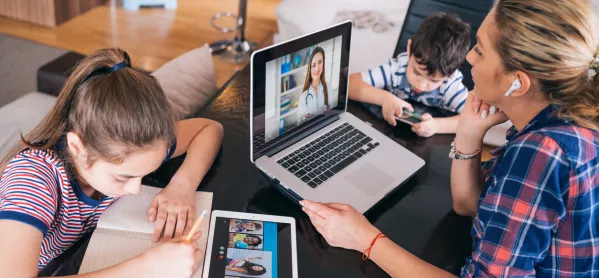What edu-research tells us about closing the Covid gap

The past year has been extremely challenging for the education sector. The Covid-19 pandemic has severely impacted all our lives, with education undergoing two school closures, in March 2020 and January 2021, except for children of key workers.
These two closures were experienced very differently - the first came out of nowhere and was something that had never happened before. The second was, if hastily arranged, at least something schools, parents and children were broadly familiar with.
So what was the difference, educationally, between the two lockdowns?
Back to school: Six clever classroom hacks
New teachers: How to build confidence in the classroom
Inset days: We need to put the C, P and D back into CPD
In a recent project funded by the Economic and Social Research Council (ESRC), we used family-level data from the Understanding Society survey to ask a representative sample of families about their experiences with schooling during the two closure periods.
The following findings, in particular, are interesting:
- Compared to the first school closure period, the second closure showed an improved provision of schoolwork in primary and secondary schools.
- Specifically, the number of offline and online lessons per day increased, which led to a larger volume of schoolwork, demonstrating that teachers and schools had adapted well from the first lockdown and were better prepared during the second.
- The influence of parental occupation on the hours of schoolwork completed was substantial and magnified by access to computers and parental working patterns. However, overall inequalities between socio-economic groups remained stable between the two closures.
- While inequalities between socio-economic groups in the uptake of schoolwork remained generally stable between the closure periods, better school provision and better family engagement with schoolwork contributed to an improvement in the total hours of schoolwork completed.
Covid catch-up: addressing education inequalities
What do these findings mean for schools when it comes to addressing educational inequalities?
1. The importance of keeping schools open
If possible, schools need to remain open during any future phases of high infection to avoid losing years of academic progress and further widening the achievement gap between socio-economic groups.
However, should schools be forced to close again, inequalities in learning can be mitigated by increasing the provision of lessons, providing students with better access to computers and by providing academic tutors to compensate for the absence of parents who cannot work from home.
2. Measuring socio-economic disadvantage
The pandemic has shown that the traditional proxy measure of socio-economic disadvantage in education - entitlement to free school meals - is too crude.
Instead, when providing schoolwork remotely during school closures, schools should consider providing guidance and tutoring targeted at children who do not have access to a computer, children of single parents, and children of parents who cannot work from home, in sectors such as, agriculture, production and sales.
Our analysis has shown that the work patterns of families have an influence on home-schooling, and that these are further influenced by computer availability and school provisions.
3. Catch-up tutoring
The government’s catch-up funding and schemes such as the National Tutoring Programme are a laudable effort at closing the attainment gap between socio-economic groups. However, from a quantitative point of view, the total allocation per pupil of £80, which amounts to six additional days of schooling, is likely to be insufficient to make any significant dent in the attainment gap between socio-economic groups.
Catch-up tutoring should be in the order of several weeks of schooling, but it is important to target online and offline resources, tutoring (online and face-to-face) and computer hardware to those students that our research has identified as being in greatest need. To do otherwise risks piling disadvantage upon disadvantage, from which it would be very difficult to recover.
Schools and local partnerships, and not central government, are in the best position to identify those students and families most in need, and should be provided with the necessary funding and flexibility to target provision and support to the most disadvantaged students.
And while schools can continue to improve their online, offline and face-to-face provision, family context and the context of the individual child needs to be taken into account.
We have known for quite some time that tailored, targeted tutoring can be very efficient: Bloom’s “two-sigma” research found that the average student, tutored one to one using mastery learning techniques, performed two standard deviations better than students who learn via conventional instructional methods.
Reasons for optimism
The Covid-19 pandemic has been a very challenging time for everyone in the education sector and there are important inequalities in education that need to be addressed.
However, there are also reasons to be optimistic: offline and online provision provided by schools has improved and schools have become more experienced in dealing with the challenges associated with out-of-school learning.
It is also reassuring that the improved provision has at least halted the increase in inequalities. Society has reason to be thankful to schools and teachers who have worked so hard to provide children with the education they needed at such a time.
Christian Bokhove is associate professor in mathematics education at the University of Southampton and a specialist in research methodologies. Tony Kelly is professor of education at the University of Southampton and specialises in educational effectiveness and policy. Dr Nicola Pensiero is a lecturer in quantitative education and social science at Southampton Education School, University of Southampton
You need a Tes subscription to read this article
Subscribe now to read this article and get other subscriber-only content:
- Unlimited access to all Tes magazine content
- Exclusive subscriber-only stories
- Award-winning email newsletters
Already a subscriber? Log in
You need a subscription to read this article
Subscribe now to read this article and get other subscriber-only content, including:
- Unlimited access to all Tes magazine content
- Exclusive subscriber-only stories
- Award-winning email newsletters